Redditor Who Tried Their Hardest To Find The Owner Of A Lost Puppy Refuses To Return It After Finding Him A New Home
Losing your pet is one of the worst things that can happen to a dog owner. Sometimes, dogs can wander off and get lost, and finding them is usually quite hard.
The best course of action that a dog owner can take to increase the chances of finding their dog is to hang posters around or post about it on social media. Other than that, all you can do is wait and hope for the best.
Finding someone's lost dog is also a difficult situation to deal with, especially if the dog has wandered a little too far from home. Even if you happen to find someone who claims to own the dog, they need to provide proof of ownership because anyone can make that claim just to get a free dog.
A Reddit user who goes by the username u/Time-Flight2838 made a post on the r/AmItheAhole subReddit where they explained how they found a lost puppy and did everything they could to find the original owner. The Redditor eventually got contacted by a family that claims to own the dog, but giving the dog back turned out to be more complicated than usual. Scroll down and check out the original Reddit post.
Here's the original post by Reddit user u/Time-Flight2838:
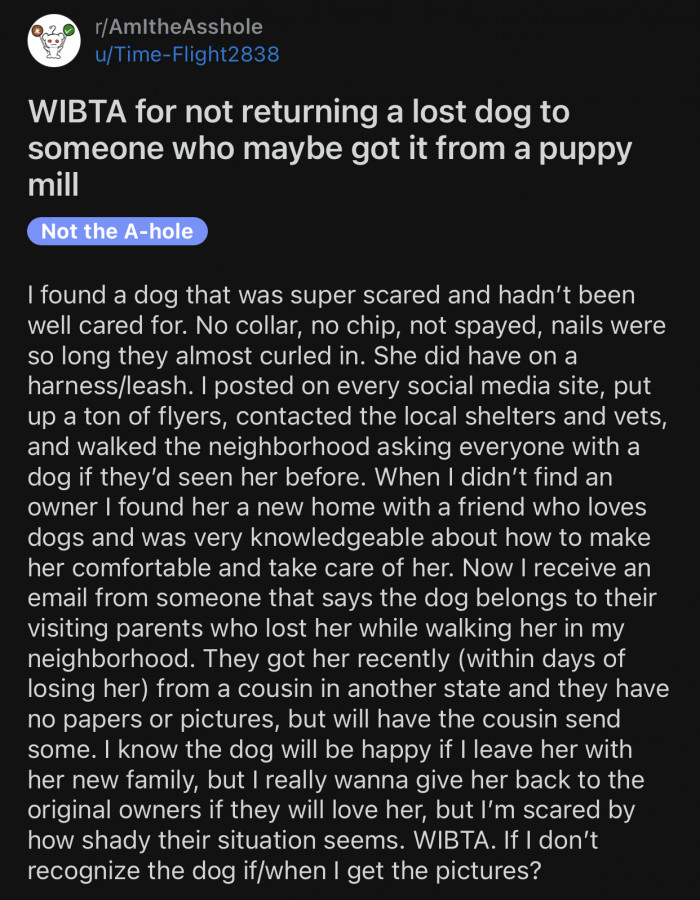
Here's the reason why OP thinks they might be the A-hole in this situation:

Here's how the Reddit community reacted to u/Time-Flight2838's post:
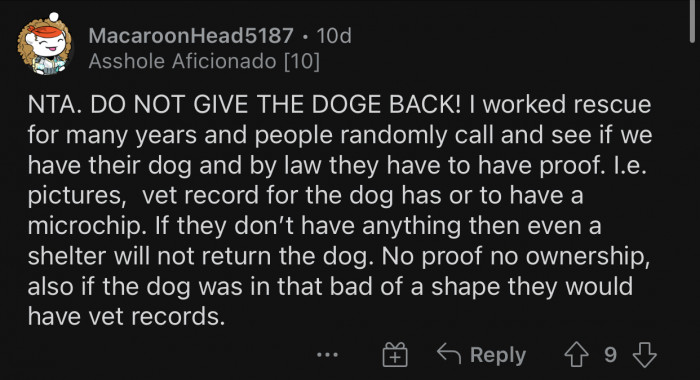
The Psychology of Attachment in Pet Ownership
Understanding attachment theory can illuminate the strong bond formed between individuals and pets. According to research by Dr. John Bowlby, the creator of attachment theory, these bonds often mirror those formed with primary caregivers.
When a Redditor finds a lost puppy and forms an attachment, it reflects a deep-seated need for connection and belonging that is intrinsic to human nature.
Understanding Attachment Theory in Pet Ownership
Attachment theory suggests that our early relationships shape how we connect with others throughout life.
In the case of this Redditor, their bond with the puppy may reflect a deep-seated need for connection and nurturing, leading them to prioritize the puppy's well-being over returning it to its original owner.
Research indicates that individuals with strong attachment styles are likely to invest heavily in relationships, including those with pets.
OP eventually commented on their own post to provide more context about the situation:

As long as the family has proof of ownership, they should get their dog back.

The story they provided doesn't really add up.
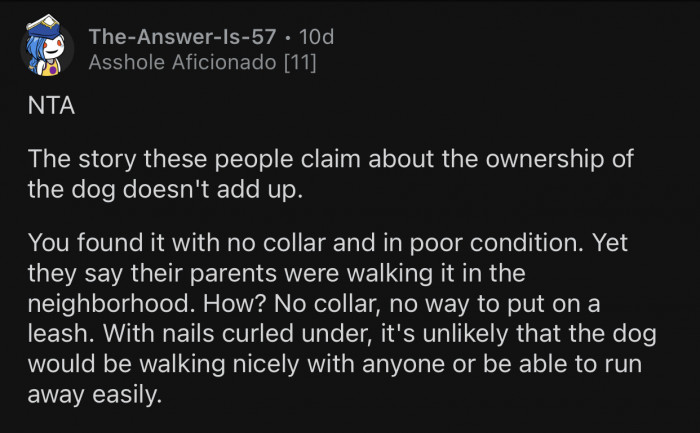
Studies show that when individuals perceive a pet as vulnerable, they are often compelled to act in ways that protect that animal, sometimes at the expense of other considerations.
This phenomenon can create internal conflict, especially when the individual feels responsible for the animal's well-being while also wanting to honor its previous owner's rights.
This scenario raises questions about ownership and responsibility in the context of lost pets.
According to social psychology studies, people often perceive themselves as the rightful caretakers of animals they’ve bonded with, which can lead to complex moral dilemmas.
The Redditor's decision to keep the puppy may stem from a belief that they can provide a better environment than the original owners.
It's obvious the dog was not being taken care of properly.

The dog is exactly where it belongs. Nothing can guarantee that the dog will have a good life.
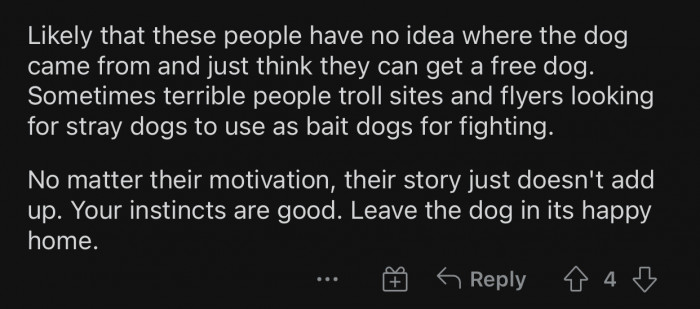
A leash can be attached to a harness quite easily.

Navigating Moral Dilemmas in Animal Care
Moral psychology provides insight into the ethical considerations involved in rehoming pets. Research shows that individuals often experience cognitive dissonance when their actions conflict with their beliefs about responsibility and care.
This discomfort can lead to justifying decisions, such as choosing to keep a pet over returning it to its original owner, as the individual seeks to reconcile their feelings of attachment with perceived moral obligations.
Moral Dilemmas and Decision-Making
Psychologically, the decision-making process in this context can be influenced by cognitive dissonance.
When individuals feel conflicted about their choices, such as wanting to return the puppy versus wanting to keep it, they may experience discomfort.
Research from the Journal of Abnormal Psychology highlights that resolving this dissonance often leads to justifying one's actions to align with their beliefs.
Some dogs are exclusively on harnesses. It's considered safer.

Other people shared the previous user's opinion about only using a harness.
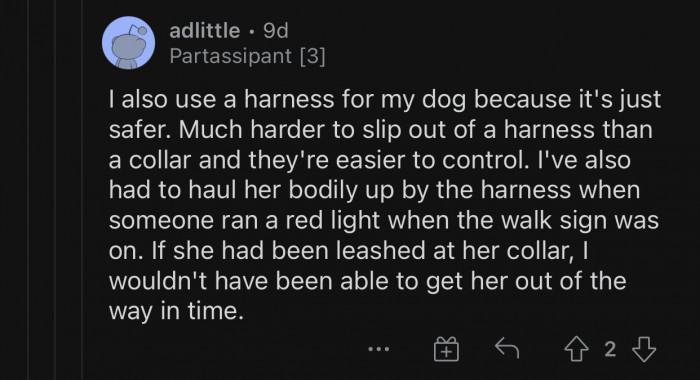
The dog wasn't necessarily neglected according to the available proof. But the story is still a little off.

Effective coping strategies for dealing with such dilemmas involve acknowledging conflicting feelings and seeking guidance from ethical frameworks.
Encouraging individuals to reflect on their motivations and the potential impact of their decisions on all parties involved can facilitate a more balanced perspective.
Engaging in discussions with others about these dilemmas can also help clarify one's values and responsibilities.
In such scenarios, social norms can further complicate the decision-making process.
Studies show that societal expectations can exert pressure on individuals to act in certain ways, which may conflict with personal desires and values.
The Redditor's internal conflict likely reflects this tug-of-war between societal norms regarding pet ownership and their personal feelings towards the puppy.
The story still does not add up.

OP could take some precautions before giving the dog back.

The owners have to generate proof of ownership. It's impossible not to have at least one picture with the dog.
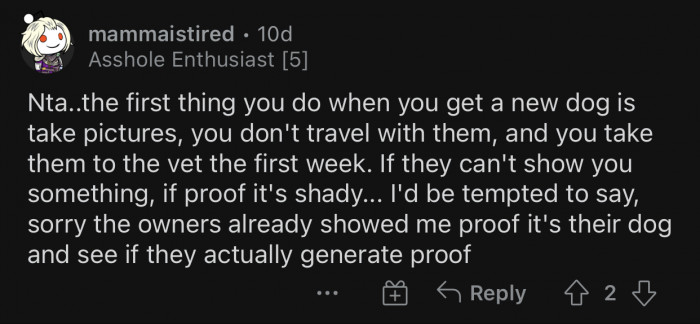
The Impact of Emotional Investment on Decision-Making
Emotional investment in animals can significantly influence decision-making processes. According to Dr. William Doherty, a family therapist, "Our emotional attachments can often lead us to make decisions that prioritize our feelings over logical reasoning." In this case, the Redditor’s attachment to the puppy may lead them to rationalize keeping it, despite the ethical implications of that choice.
Practical Recommendations for Ethical Decisions
To navigate similar moral dilemmas, individuals can benefit from establishing clear guidelines regarding pet ownership and care.
Engaging in open dialogues with community members about pet responsibilities can foster a sense of shared ethics and responsibilities.
Additionally, reaching out to local shelters or rescue organizations can provide resources and support for making informed decisions about pet care.
OP did everything they could to find the dog's owners.
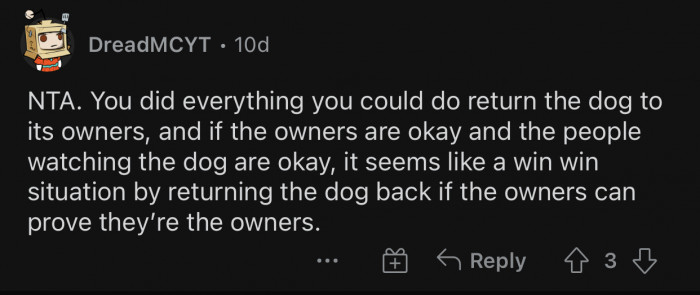
The new family should also have a say in this.

It's obvious they cannot be trusted with the dog unless they prove otherwise.

Encouraging reflection on these emotional investments can be beneficial. Individuals can benefit from asking themselves questions such as, 'What is motivating my desire to keep this pet?' or 'How will this decision affect the pet's well-being in the long run?'
These reflective practices align with cognitive-behavioral strategies that promote critical thinking and emotional regulation.
Understanding the implications of our decisions regarding lost pets requires a balance of empathy and ethical considerations.
It's essential to weigh the emotional needs of the animal against the rights of the original owner, as this can guide more compassionate decision-making.
Ultimately, fostering a community perspective on pet ownership can lead to better outcomes for both animals and their caretakers.
OP did everything in her capacity to find the puppy's original owner and went above and beyond before she ran out of options. The family that claims the dog belongs to them should provide more proof before moving the puppy to another family that might not necessarily give it a good life.
If you enjoyed this story, make sure to check out similar content on our platform.
The Role of Empathy in Pet Care Decisions
Empathy plays a crucial role in how we make decisions surrounding animals, influencing our willingness to go above and beyond for their welfare.
Research shows that empathetic individuals are more likely to prioritize the needs of a pet, sometimes leading them to overstep boundaries in complex situations.
Fostering empathy through community engagement and education can help individuals navigate these challenges with greater awareness and understanding.
Psychological Analysis
This behavior reflects the complexities of attachment in relationships with animals, where the emotional bond can sometimes obscure ethical considerations.
It’s important to appreciate that while the desire to protect and nurture is deeply human, it must be balanced with respect for the rights and feelings of the original owners.
Analysis generated by AI
Analysis & Alternative Approaches
This case emphasizes the importance of understanding our emotional connections and ethical responsibilities when it comes to pet ownership.
Research indicates that fostering empathy and open communication can guide individuals toward more responsible and compassionate decisions.
Ultimately, balancing personal values with societal expectations will lead to healthier outcomes for pets and their caretakers.
Building Healthy Relationships with Pets
Research indicates that maintaining a healthy relationship with pets involves understanding their needs and ensuring a safe environment.
Dr. Karen Overall, a veterinary behaviorist, emphasizes the importance of recognizing when an animal may be happier in a different home, suggesting that fostering a pet's happiness can lead to better outcomes for everyone involved.
Balancing emotional ties with practical considerations is key to responsible pet ownership.
Analysis & Alternative Approaches
Understanding the psychological factors influencing our decisions regarding pets can help individuals navigate complex situations more effectively.
Research shows that reflecting on emotional ties and ethical obligations can lead to more informed and compassionate choices that benefit both pets and their owners.



